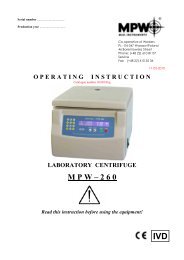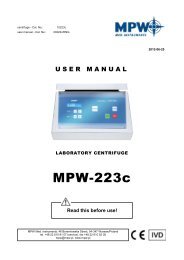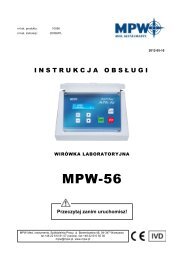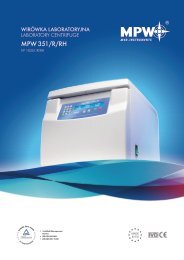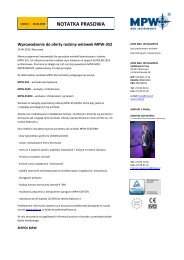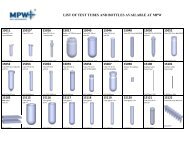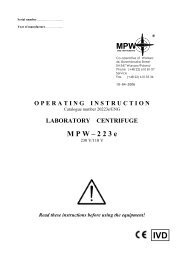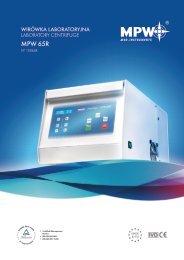LABORATORY CENTRIFUGE MPW – 2 2 3 b Read before start
LABORATORY CENTRIFUGE MPW – 2 2 3 b Read before start
LABORATORY CENTRIFUGE MPW – 2 2 3 b Read before start
You also want an ePaper? Increase the reach of your titles
YUMPU automatically turns print PDFs into web optimized ePapers that Google loves.
Serial number..........…………........<br />
Year of production………...….......<br />
<strong>MPW</strong><br />
MED. INSTRUMENTS<br />
®<br />
Co-operative of Workers<br />
46 Boremlowska Street<br />
04-347 Warsaw/Poland<br />
Tel. (+48 22) 610 81 07 Service<br />
Fax. (+48 22) 610 55 36<br />
07-07-2006<br />
O P E R A T I N G I N S T R U C T I O N<br />
Catalogue number 20223b/ENG<br />
<strong>LABORATORY</strong> <strong>CENTRIFUGE</strong><br />
M P W <strong>–</strong> 2 2 3 b<br />
<strong>Read</strong> <strong>before</strong> <strong>start</strong> !<br />
Centrifuge has the Acceptance Certificate admitting it for use in treatment in public<br />
health service institutions<br />
IVD
1. Application<br />
2. Technical data<br />
2.1. Accessories<br />
2.1.1. Basic accessories<br />
2.1.2. Optional accessories<br />
2.2. Exploitation materials<br />
3. Installation<br />
3.1. Unpacking of the centrifuge<br />
3.2. Location<br />
3.3. Connection to mains<br />
3.4. Fuses<br />
4. Description of the centrifuge<br />
4.1. General description<br />
5. Safe working conditions<br />
5.1. Operating personnel<br />
5.2. Guarantee period and operation life<br />
5.3. Safekeeping period<br />
5.4. Hints on centrifuging<br />
5.5. Hazards and precautions<br />
6. Operation of the centrifuge<br />
6.1. Mounting of the rotor and accessories<br />
6.2. Construction and safety measures<br />
6.3. Drive<br />
6.4. Data setting and read-out<br />
6.5. Controls<br />
6.6. Safety devices<br />
6.6.1. Cover lock<br />
6.6.2. Rest state check<br />
- 2 -<br />
Contents
- 3 -<br />
7. Description of the centrifuge operating elements<br />
7.1. Control panel - Drawing No. 2<br />
7.2. Switching the centrifuge on<br />
7.2.1. Selection of the program<br />
7.2.2. Start of the program<br />
7.2.3. Emergency stop<br />
7.2.4. End of the centrifuging<br />
7.2.5. Programming<br />
7.3. Mathematical relations<br />
7.3.1. RCF - relative centripetal force<br />
7.3.2. Nomogram of relationship - rotational speed/centrifuging radius/RCF <strong>–</strong> Drawing No. 3<br />
7.3.3. Maximum load<br />
8. Cleaning, disinfection, maintenance<br />
8.1. Cleaning of the centrifuge<br />
8.2. Cleaning of the accessories<br />
8.3. Lubrication<br />
8.4. Glass cracking<br />
8.5. Sterilization and disinfection of the rotating chamber and accessories<br />
9. Emergency conditions <strong>–</strong> service<br />
9.1. Troubleshooting<br />
10. Work safety<br />
10.1. Work safety inspection procedures<br />
10.2. Inspection procedures carried out by the operator<br />
11. Conditions of repairs<br />
12. Manufacturer’s data<br />
13. Information about Distributor
- 4 -<br />
1. Application<br />
The <strong>MPW</strong>-223b centrifuge is a table top laboratory centrifuge intended for in vitro diagnostic (IVD).<br />
Its construction ensures easy operation, safe work and wide range of applications in laboratories engaged in<br />
routine medical analyses, biochemical research works etc. It is intended for separation of mixtures, suspensions<br />
and systemic fluids into constituents of different densities under influence of the centrifugal force. This<br />
centrifuge is not biotight and therefore during centrifugation of preparations that require biotightness one has to<br />
use closed and sealed buckets and rotors. It is prohibited to centrifuge caustic, inflammable and explosive<br />
preparations in the centrifuge.<br />
2. Technical data<br />
Manufacturer: “<strong>MPW</strong> Med. instruments” Co-operative of Workers<br />
46 Boremlowska Street, Warsaw/Poland<br />
Type: <strong>MPW</strong>-223b<br />
Mains: L1+N+PE V/Hz ±10 % 230 V 50/60 Hz, optionally 110 V 50/60 Hz<br />
Power consumption 120 W<br />
Class of protection against electrc shock basic<br />
Interferencelevel PN-EN-55011<br />
Noise level 50 dB<br />
Rotational speed range 300 � 4000 rpm<br />
Maximum capacity 40 ml<br />
Maximum acceleration RCF 2320 x g<br />
Maximum kinetic energy 1536 Nm<br />
Time range 1 � 99 min<br />
SHORT <strong>–</strong> short duration operation<br />
Physical data:<br />
Depth 435 mm<br />
Width 355 mm<br />
Height 270 mm<br />
Weight 13 kg<br />
Centrifuge operation conditions: PN-EN-61010-1 p. 1.4.1.<br />
Environmental temperature + 5� � + 40� C<br />
Relative humidity at ambient temperature � 80 %<br />
Installation category II PN-EN 61010-1<br />
Degree of pollution 2 PN-EN 61010-1<br />
Protection zone 300 mm<br />
Statement of Conformity:<br />
The following machine is in accordance with the regulations of the EU Directive 98/79/EC and with the<br />
harmonized standards PN-EN 61010-1 and PN-EN 61010-2-020.<br />
2.1. Accessories<br />
2.1.1. Basic accessories (enclosed with every centrifuge)<br />
- 17142 complete clamp pc. 1<br />
- 17099T spanner for the rotor “ 1<br />
- 17162 key for the lock “ 1<br />
- 17861 WTA-T 4 A 250 V fuses pcs. 2
- 5 -<br />
- 17866 power cord 230 V pc. 1 or<br />
- 17867 power cord 110 V “ 1<br />
- 20223b/ENG Operating Instruction “ 1<br />
2.1.2. Optional accessories<br />
Depending of the customer’s needs the <strong>MPW</strong>-223b centrifuge can be provided with accessories specified below:<br />
Cat. No. Type of rotor Angle Rotor capacity Max. rpm<br />
12331 Swing-out rotor 4x5/7/10 ml 4000<br />
Cat. No. Equipment name<br />
13081 Bucket for test tubes 10/6/5 ml (� 13/17x70/85 mm) for rotor No. 12331<br />
13083 Bucket for test tubes 8.5 ml (� 15.3x92 mm) for rotor No. 12331<br />
14083 Round carrier for test tubes 4.9 ml (� 17.6/13 mm) for bucket No. 13083, 13081<br />
2.2. Exploitation materials<br />
For centrifuge operation one should use only original company brand buckets comprised in the specification of<br />
accessories as well as test-tubes for centrifuges of proper diameter, length and strength. Use of test-tubes of other<br />
makes shall be agreed upon with manufacturer of the centrifuge. For cleaning and disinfecting one should to use<br />
agents generally used in the health service, such as e.g. Aerodesina-2000, Lysoformin 3000, Malseptol, Malsept<br />
SF, Sanepidex, Cutasept F.<br />
3. Installation<br />
3.1. Unpacking of the centrifuge<br />
Open the package. Take out the cardboard box containing the accessories. Take out the centrifuge from the<br />
package. Keep the package and packing materials at hand for possible transport at a later date.<br />
3.2. Location<br />
Almost all energy being supplied to the centrifuge is transformed into heat and then emitted to the environment.<br />
This is the reason why proper ventilation is essential. Ventilation ducts situated in the centrifuge have to be fully<br />
efficient. Moreover the centrifuge shall not be located near the radiators and shall not be subjected to direct<br />
sunlight. The table for the centrifuge shall be stable and shall have flat levelled table top. Safety zone has to be<br />
established around the centrifuge with the minimum radius of 30 cm. Under normal operating conditions ambient<br />
temperature shall not drop below 15� C or raise above 35� C. In the case of changing location from a cold to<br />
warm one there will occur condensation of water inside the centrifuge. It is important then that sufficient time<br />
shall be allowed for drying the centrifuge prior to re<strong>start</strong>ing of the centrifuge (minimum 4 hours).<br />
3.3. Connection to mains<br />
Supply voltage given on the rating plate has to be consistent with local supply voltage. <strong>MPW</strong> Med. instruments<br />
laboratory centrifuges are I safety class devices and are provided with the three-core cable of 2.5�3.2 m length<br />
with the plug resistant to dynamic loadings. Mains socket shall be provided with the safety pin. Neutral<br />
grounding of mains socket safety pin has to be verified by authorized services. This verification has to be carried<br />
out each time when mains socket is being replaced. It is recommended to install emergency cut-out that shall be<br />
installed far from the centrifuge, near the exit door from the room or outside the room. Supply voltage 230V<br />
50/60 Hz, optionally 110 V 50/60 Hz.<br />
3.4. Fuses<br />
The centrifuge has standard protection with the WTA-T 4A 250 V fuse situated in the plug-in socket and master<br />
switch unit at back wall of the centrifuge.
- 6 -<br />
4. Description of the centrifuge<br />
4.1. General description<br />
New generation of <strong>MPW</strong> Med. instruments laboratory centrifuges is provided with modern microprocessor<br />
control systems, very durable and quiet asynchronous brushless motors and accessories consistent with modern<br />
requirements.<br />
5. Safe working conditions<br />
5.1. Operating personnel<br />
<strong>MPW</strong>-223b Laboratory Centrifuge can be operated by laboratory personnel after getting acquainted with the<br />
Instruction Manual.<br />
Instruction Manual shall be always near the centrifuge.<br />
Instruction Manual must be constantly at hand!!<br />
5.2. Guarantee period and operation life<br />
Guarantee period for <strong>MPW</strong>-223b centrifuge amounts to minimum 24 months.<br />
Principles are specified in guarantee certificate. The service life of the centrifuge specified by the manufacturer<br />
amounts to 10 years.<br />
After termination of guarantee period it is necessary to carry out annual technical inspections of the<br />
centrifuge made by authorized service of manufacturer.<br />
The manufacturer reserves the right to make modifications at produced goods.<br />
5.3. Safekeeping period<br />
Maximum period of storage of not used centrifuge amounts to 1 year. After this period one should ask authorized<br />
service to carry out an inspection of the device.<br />
5.4. Hints on centrifuging<br />
1. Set the centrifuge in horizontal position on rigid base.<br />
2. Ensure safe location.<br />
3. Ensure free space around the centrifuge, within at least 30 cm.<br />
4. Ensure sufficient ventilation.<br />
5. Fix firmly the rotor on the motor shaft.<br />
6. Avoid unbalance.<br />
7. Load opposite buckets with the same accessories.<br />
8. Centrifugation of the test tubes of different dimensions.<br />
In principle it is possible to centrifuge test tubes of different dimensions, however it is absolutely<br />
necessary in such cases that opposite round carriers have to be the same.<br />
The test tubes shall be not only inserted symmetrically but round carriers and their hangers shall be<br />
equally loaded. It is not allowed to operate centrifuge with asymmetric loads applied to rotors and<br />
buckets.<br />
9. Load all places in rotors.<br />
10. Fill test tubes outside the centrifuge.<br />
11. Glass tubes shall be test tubes intended for centrifuges of proper strength enabling centrifugation<br />
with acceleration up to 5000 x g.<br />
12. Fill in the test tubes with the medium of the same weight, in order to protect the centrifuge against<br />
unbalance.<br />
13. Lubricate the rotor journal pins.<br />
14. Use only accessories kept in good condition.<br />
15. Protect equipment against corrosion using accurate preventive maintenance.
- 7 -<br />
16. Infectious materials could be processed in closed buckets only.<br />
17. It is prohibited to centrifuge explosive and inflammable materials.<br />
18. It is prohibited to centrifuge substances prone to reacting in result of supplying high energy during<br />
centrifugation.<br />
5.5. Hazards and precautions<br />
1. Prior to <strong>start</strong>ing the trial of switching the centrifuge on, one shall read exactly all sections of this<br />
instruction in order to ensure smooth run of operation, avoiding damages of this device or its<br />
accessories.<br />
2. Centrifuge can be operated by laboratory personnel getting acquainted with the Instruction Manual.<br />
3. Centrifuge must not be transported with the rotor mounted on the motor shaft.<br />
4. One must use original rotors, test-tubes and spare parts only.<br />
5. In case of faulty operation of the centrifuge one shall ask for assistance of service of <strong>MPW</strong> Med.<br />
instruments Company or its accredited representatives.<br />
6. It is prohibited to switch the centrifuge on if it is not installed properly or rotor is not fitted correctly.<br />
7. The centrifuge must not be operated in places where explosion hazard appears as it is not of<br />
explosion-proof make.<br />
8. It is prohibited to centrifugate materials which could generate inflammable or explosive mixtures<br />
when in contact with air.<br />
9. It is prohibited to subject to centrifugation toxic or infectious materials without taking proper safety<br />
measures (work in properly adapted rooms, personal safety equipment). Proper disinfection<br />
procedures have to be carried out when dangerous substances contaminated the centrifuge or its<br />
accessories.<br />
10. One must not open the cover manually - in emergency procedure, when rotor is still turning.<br />
11. One must not exceed limit load set by the manufacturer.<br />
Rotors are intended for fluids of average homogeneous density equal to 1.2 g/cm 3 or smaller when<br />
centrifugation is carried out at maximum speed. When fluids of higher density shall be used, then it is<br />
necessary to limit the speed (see point 7.3.3 “Maximum load”).<br />
12. One must not to use the rotors, buckets and round carriers with symptoms of corrosion or other<br />
mechanical defects.<br />
13. One must not subject to centrifugation substances of high corrosion aggressiveness, which could cause<br />
material impairment and lower mechanical properties of rotors, buckets and round carriers.<br />
14. One must not use rotors and accessories not admitted by the manufacturer.<br />
It is permitted however to use commercial glass and plastic test tubes intended by manufacturer of<br />
these test tubes for centrifugation in laboratory centrifuges. It is distinct warning against using<br />
accessories not specified in the Instruction Manual. Cracking of test tubes not intended for<br />
centrifugation can result in dangerous unbalance.<br />
15. One must not carry out centrifugation with the rotors with taken off or not tight driven caps.<br />
16. One must not lift or shift the centrifuge during operation and rest on it.<br />
17. One must not stay in the safety zone within 30 cm distance around the centrifuge neither leave any<br />
things, e.g. glass vessels, within this zone.<br />
18. It is prohibited to put any things on the centrifuge.<br />
6. Operation of the centrifuge<br />
6.1. Mounting of the rotor and accessories<br />
1. Connect the centrifuge to mains (master switch at back wall of the centrifuge).<br />
2. Open the cover of the centrifuge pushing the pushbutton COVER. Prior to putting the rotor in one has to<br />
check if rotating chamber is free of impurities, e.g. such as dust, glass splinters, residues of fluids that<br />
must be taken away.
3. One shall release with special spanner clamp on the motor shaft and fit the rotor on the motor shaft<br />
driving it home on the cone.<br />
4. Screw-in the bolt for fixing the rotor (clockwise) and screw it tightly home with the supplied spanner.<br />
5. Swing-out rotor have to be provided with the buckets in all seats.<br />
One should to remember that every buckets swings individually. Bucket suspension studs should be<br />
lubricated periodically with vaseline.<br />
6. In the case of rotors designed with the cover they must not be used without it. Rotor covers must be<br />
closed exactly. Rotor covers ensure smaller drags of the rotors, proper setting of the test-tubes and airtight<br />
sealing.<br />
7. One should use only buckets intended for selected types of the rotor - see p. 2.1. “Accessories”.<br />
8. Fill test tubes outside the centrifuge.<br />
9. Put on or screw the caps on vessels and rotors (when they have such).<br />
10. In the case of centrifuging in angle rotor, test tubes (buckets) have to be filled properly in order to avoid<br />
overflows.<br />
11. CAUTION: Centrifuge will tolerate small weight differences occuring during loading of rotors.<br />
However it is recommended to equalize vessels loads as much as possible in order to ensure minimal<br />
vibrations during operation.<br />
12. Maximum unbalance amounts up to 15 g.<br />
13. In order to prolong lifetime of the rotor and gaskets rotors shall be lubricated with the maintenance oil,<br />
while gaskets and threaded parts shall be lubricated with vaseline.<br />
14. For replacement of the rotor one shall release clamping by several turns of the bolt and then using both<br />
hands grab the rotor at opposite sides taking it away from drive shaft by pulling it up.<br />
- 8 -<br />
6.2. Construction and safety measures<br />
The centrifuge has rigid self-supporting structure. Housing is made of plastic while front is made of steel sheet.<br />
Cover is fixed on steel axles of hinges and from the front is locked with electromagnetic lock blocking possible<br />
opening during centrifugation. Bowl forming the rotation chamber is made of acid resistant steel sheet.<br />
6.3. Drive<br />
Drive constitutes brushless induction motor of low noise level.<br />
6.4. Data input and output<br />
Data setting and read-out system forms hermetically closed keyboard with distinctly accessible operation points.<br />
Easily readable display signalling individual performed operations facilitates to operator programming of<br />
condition of the centrifuge.<br />
Operation of the centrifuge is simple and self-evident.<br />
6.5. Controls<br />
Microprocessor control system being used in the centrifuge ensures the following possibilities of setting of<br />
parameters of operation:<br />
- rotational speed within the range from 300 up to 4000 rpm every 100 rpm with conversion and RCF readout,<br />
- centrifugation time within the range from 1 up to 99 minutes.<br />
6.6. Safety devices<br />
Apart from the above described passive devices and safety measures there exist as well active devices and<br />
elements as follows:<br />
6.6.1. Cover lock<br />
The centrifuge can be <strong>start</strong>ed only with properly closed cover. The cover can be opened only after stopping the<br />
rotor. In the case of emergency opening of the cover during operation the centrifuge will be immediately<br />
switched-off and the rotor will be braked until stopping completely. With opened cover, the drive is completely<br />
disconnected from power which makes it impossible to <strong>start</strong> the centrifuge.
- 9 -<br />
6.6.2. Rest state check<br />
Opening of the centrifuge cover is possible only with the rotor in the state of rest. This state is being checked by<br />
the microprocessor which recognizes and signals the rest state prior to opening the cover with letter S (Stop).<br />
7. Description of the centrifuge operating elements<br />
Power switching ON/OFF is carried out with master switch situated on back of the centrifuge. All settings on the<br />
centrifuge are done by means of the control panel. Panel comprises control pushbuttons, displays and signalling<br />
LEDS.<br />
7.1. Control panel<br />
Control panel placed on front casing wall serves for controlling centrifuge operation. Control panel comprises the<br />
following elements:<br />
1. Upper display field S: 4 digits (rpm) RCF 4 digits (x g)<br />
2. Lower display field T: 4 digits (m/s) S (STOP), O (opened cover), U (unbalance)<br />
3. Error signalling<br />
4. Rotor status signalling STATUS COVER blinking - rotor rotates,<br />
not illuminated - rotor does not rotate<br />
5. Function key<br />
6. Function key<br />
7. Function key<br />
► Buzzer serves for signalling function recording and determination of the centrifuge status.<br />
► key serves for <strong>start</strong>ing centrifugation program with parameters presented on display,<br />
► key serves for:<br />
- interrupting centrifugation program in any program phase and braking the rotor,<br />
- saving of preset SPEED and TIME centrifugation parameters,<br />
► key serves for opening of the cover,<br />
► serve for speed programming,<br />
► serve for time programming,<br />
► key serves for short duration operation.
- 10 -<br />
7.2. Switching the centrifuge on<br />
After switching power ON the control system calls recently implemented program and displays in relevant fields<br />
rotational speed, duration of centrifugation and cover opening status. Provided that rotor in the centrifuge is<br />
stopped, it is possible to open the cover by means of COVER key.<br />
Stopped rotor status is displayed as a S letter symbol in the display field. When this symbol is not already<br />
displayed, then one must wait till this rotor stops and the above mentioned symbol appears.<br />
7.2.1. Selection of the program<br />
Control panel can save 1 program preset by the user. Program acceptance consists in pushing STOP key.<br />
7.2.2. Start of the program<br />
After acceptance of the program and checking if rotor was mounted, centrifuge can be <strong>start</strong>ed with pushing<br />
START key, provided that cover is closed.<br />
7.2.3. Emergency stop<br />
At any time during centrifuging it is possible to interrupt the process and stop the rotor quickly with single<br />
pushing of STOP key.<br />
7.2.4. End of the centrifuging<br />
After termination of time of centrifugation preset in the program, braking follows. At the end of deceleration the<br />
rotational speed drops at slower rate in order to ensure soft settling of rotor carriers. Stopping is followed by<br />
buzzer signal and is displayed by S letter symbol. After pushing COVER pushbutton the cover opens and O<br />
symbol is displayed.<br />
7.2.5. Programming<br />
Programming mode is activated with pushing SPEED and TIME (+) (-) keys after selection of parameters of the<br />
program which one would like to save or change. Acceptance of preset parameters is done by pushing STOP key.<br />
One can save one program only.<br />
7.3. Mathematical relations<br />
7.3.1. RCF <strong>–</strong> relative centripetal force<br />
RCF acceleration is the acceleration generated by the rotor rotary motion acting upon tested product and it can be<br />
calculated according to the formula:<br />
RCF = 11.18 * r * (n/1000) 2<br />
where RCF [x g]<br />
r [cm]<br />
n [rpm]<br />
Depending on the distance of particles of the tested product from the axis of rotation one can find from above<br />
formula minimum RCF, average RCF or maximum RCF. On the basis of preset RCF value and given radius of<br />
the bottom in the bucket one can calculate from the formula the rotational speed to be set in the program of<br />
centrifuging. Selection of the time of sedimentation and the RCF value shall be carried out experimentally for a<br />
given product.<br />
Once every 100 rpm electronic circuit automatically calculates and displays averaged RCF value.<br />
7.3.2. Nomogram of relationship <strong>–</strong> rotational speed/centrifuging radius/RCF <strong>–</strong> Drawing No. 3<br />
7.3.3. Maximum load<br />
In order to avoid overloading of the rotor one shall observe maximum load which is recorded on every rotor.<br />
Maximum permissible load is reached when all test-tubes are filled with the fluid with 1.2 g/cm 3 density.
- 11 -<br />
If density of the centrifugated liquid is higher than 1.2 g/cm 3 , then test-tubes could be filled only partially or one<br />
shall limit operation speed of the centrifuge that is being calculated from the formula:<br />
8. Cleaning, disinfection, maintenance<br />
n perm = n max *<br />
� = specific gravity<br />
1,<br />
2<br />
�<br />
� G<br />
�<br />
�cm<br />
n max [maximum rotational speed - rpm]<br />
CAUTION!!! Use safety gloves for operations specified below.<br />
8.1. Cleaning of the centrifuge<br />
Prior to <strong>start</strong> of cleaning and disinfection of the centrifuge one shall put the safety gloves on. For cleaning shall<br />
be used water with soap or other water soluble mild detergent. One should avoid corrosion inducing substances<br />
and aggressive substances. It is prohibited to use alkaline solutions, inflammable solvents or agents containing<br />
abrasive particles.<br />
8.2. Cleaning of the accessories<br />
In order to ensure safety operation one shall in regular way carry out periodical maintenance of the accessories.<br />
Manufactured rotors, buckets and round carriers have to withstand steady high stresses originated from the field<br />
of gravitation. Chemical reactions as well as corrosion (combination of variable pressure and chemical reactions)<br />
can cause corrosion or destruction of metals. Hard to observe surface cracks increase gradually and weaken<br />
material without visible symptoms. In the case of observation of surface damage, crevice or other change, as well<br />
the corrosion, given part (rotor, bucket, etc.) shall be immediately replaced. In order to prevent corrosion one has<br />
to clean regularly the rotor together with the fastening bolt, buckets and round carriers. Cleaning of the<br />
accessories shall be carried out outside of the centrifuge once every week or still better after each use. Then those<br />
parts shall be dried using soft fabric or in the chamber drier at ca. 50� C.<br />
Especially prone to the corrosion are parts made of aluminium. For cleaning them one should use very neutral<br />
agent of pH value within 6�8 range. It is forbidden to use alkaline agents of pH above 8. In this way substantially<br />
is increased useful service life and diminished susceptibility to corrosion. Accurate maintenance also increases<br />
service life and protects against premature rotor failures. Corrosion and damages resulting from insufficient<br />
maintenance could not be object of claims lodged against the manufacturer.<br />
8.3. Lubrication<br />
The rotor pins shall be always lubricated with acid-free vaseline. In this way is ensured uniform deflection of the<br />
buckets and quiet centrifuge operation.<br />
8.4. Glass cracking<br />
In the case of glass cracking one shall wear safety gloves and all debris shall be accurately removed. Rubber<br />
inserts shall be exactly cleaned or possibly replaced. Otherwise one has to take into account the following<br />
possibilities:<br />
- Glass particles left in the rubber cushion (pad) will cause once more glass cracking.<br />
- Glass particles left in containers make impossible uniform deflecting of the buckets and round carriers<br />
resulting in unbalance.<br />
- Glass particles left in the rotor chamber cause metal abrasion because of strong air circulation. This dust will<br />
not only contaminate the centrifuge chamber, rotor, buckets, carriers and centrifuged material but will cause as<br />
well damages of surfaces of the accessories, rotors and the centrifuge chamber. For complete removal of glass<br />
particles and metal dust from the rotor chamber it is recommended to place on the bowl strip of vaseline (from<br />
the top down to bottom). Then rotor shall operate for several minutes at moderate speed. Glass and metal<br />
3<br />
�<br />
�<br />
�
- 12 -<br />
particles will collect on lubricated area and could be easily removed with the piece of cloth together with the<br />
grease. This operation can be repeated in case of need.<br />
8.5. Sterilization and disinfection of the rotating chamber and accessories<br />
One can use all standard disinfectants. The centrifuges and accessories are constructed from various materials<br />
and one should to take into account possible variety of materials. During sterilization by means of steam one<br />
should consider temperature resistance of individual materials. We would like to add that for centrifuging for<br />
instance infectious materials it is necessary to use hermetically closed buckets in order to protect their migration<br />
into the centrifuge. Buckets and rotors can be sterylized in autoclave with temperature 121 o <strong>–</strong> 124 o C and<br />
pressure 215 kPa during 15 min. Disinfection is carried out with disinfectants generally used in the Health<br />
Service, such as e.g. Aerodesina-2000, Lysoformin 3000, Malseptol, Malsept SF, Sanepidex, Cutasept F.<br />
User is responsible for proper disinfection of the centrifuge, if some dangerous material was spilled inside<br />
or outside the centrifuge. During above mentioned works one must wear safety gloves.<br />
9. Emergency conditions <strong>–</strong> service<br />
9.1. Troubleshooting<br />
Majority of faults could be cancelled by switching the centrifuge OFF and then ON. After switching the<br />
centrifuge ON shall be displayed parameters of the recently implemented program and buzzer signals consisting<br />
of four successive tones. In the case of short-duration power failure the centrifuge terminates cycle.<br />
Please find below the most frequent faults and their repair metods.<br />
1. Lack of display and check buzzer: Remedies:<br />
Is mains socket live? Check mains socket fuse.<br />
Is supply cable plugged into mains? Plug correctly supply cable.<br />
Is input fuse good? Replace input fuse (rated data on rating plate).<br />
Is master switch switched ON? Switch ON power supply.<br />
The above was checked and still there is no<br />
display active and no check buzzer sound.<br />
Call service.<br />
2. Centrifuge does not <strong>start</strong><br />
START key pushing does not generate reaction<br />
or single tone only<br />
Remedies<br />
Rotor stopping symbol S is not displayed yet Wait till rotor stops and the rotor stopping symbol is<br />
displayed<br />
Cover opening symbol O is displayed Close cover. S symbol that means stop should be<br />
displayed.<br />
LED STATUS diode is blinking: Centrifugation cycle in progress, push STOP key or<br />
wait till cycle ends.<br />
Indications show a cycle in progress but the Switch power supply OFF/ON. If fault still persists<br />
motor does not <strong>start</strong><br />
then call service.<br />
3. Programming function not active Remedies<br />
It is impossible to record parameter values to<br />
memory, last recorded program can not be<br />
recalled. Disturbances on displays possible too.<br />
Call service.<br />
4. Centrifuge <strong>start</strong>s but does not accelerate Remedies<br />
E symbol displayed after stopping. Drive Wait for 15 minutes and switch again after opening<br />
overload<br />
and closing the cover.<br />
5. One can not open the cover Remedies<br />
Rotor stopping S symbol not displayed yet, after Rotor is still rotating. Wait for stopping of the rotor<br />
pushing cover opening key single tone is audible and displaying of the S symbol.<br />
Nothing is displayed Check the centrifuge power supply<br />
Rotor stopping S symbol is displayed, but cover<br />
cannot be opened<br />
Call service
- 13 -<br />
Emergency cover release<br />
In the possible case of failure, such e.g. as power failure there exists possibility of manual opening of the cover.<br />
On the right side of the housing there is a small opening in which one shall put �2mm bar or key and push it, and<br />
the cover will be opened by itself.<br />
CAUTION! Cover can be released and opened only when rotor is in the rest state.<br />
10. Work safety<br />
10.1. Work safety inspection procedures<br />
From the point of view of operational safety the centrifuge has to be subjected to inspection carried out by<br />
authorized service engineer or especially trained experts at least once every year in the state of operational<br />
readiness. The reason for more frequent inspection could be for instance more frequent unbalance cases or<br />
corrosion inducing environment. Results of inspections, repairs and tests have to be recorded and kept on file.<br />
Operating Instruction shall be stored in the centrifuge use place.<br />
10.2. Inspection procedures carried out by the operator<br />
Operator has to pay special attention to the fact that the centrifuge parts important because of safety reasons are<br />
not damaged.<br />
This remark is specifically important for:<br />
1. Motor suspension<br />
2. Motor shaft concentricity<br />
3. Fixing the pins in the bucket<br />
4. Centrifuge accessories and especially structural changes, corrosion,<br />
preliminary cracks, abrasion of metal parts<br />
5. Screw joints<br />
6. Inspection of the rotor assembly<br />
7. Inspection of bioseals of the rotors if such are used.<br />
11. Conditions of repairs<br />
Manufacturer grants to the Buyer a guarantee on conditions specified in the Guarantee Certificate. Buyer forfeits<br />
the right to guarantee repair when using the device inconsistently with the Operating Instruction provisions, when<br />
damage resulted from the User's fault or when the Guarantee Certificate was lost.<br />
Repairs should be carried out in authorized service workshops granted with the <strong>MPW</strong> Certificate.<br />
The centrifuge shall be sent to repair after decontaminating disinfection.<br />
Information about authorized service workshops could be obtained from the Manufacturer, i.e.<br />
“<strong>MPW</strong> Med. instruments” in Warsaw, 46 Boremlowska Street<br />
Tel. (+ 48 22) 610 81 07<br />
12. Manufacturer’s data<br />
“<strong>MPW</strong> Med. instruments”, 46 Boremlowska Street, 04-347 Warsaw<br />
Phone: (+48 22) 610 56 21, 610 56 67<br />
Fax: (+48 22) 610 55 36<br />
Internet: http://www.mpw.pl<br />
E-mail: mpw@mpw.pl<br />
13. Information about Distributor<br />
YOUR DISTRIBUTOR:
- 14 -<br />
Drawing No. 1 <strong>–</strong> General view<br />
4<br />
5<br />
6<br />
7<br />
1<br />
2<br />
3<br />
1. Cover of the<br />
centrifuge<br />
2. Emergency cover<br />
release<br />
3. Control panel<br />
4. Clamping bolt<br />
5. Rotor<br />
6. Bucket<br />
7. Motor shaft
Drawing No. 2<br />
Control panel
A<br />
Centrifuging radius [cm]<br />
50<br />
45<br />
40<br />
35<br />
30<br />
29<br />
28<br />
27<br />
26<br />
25<br />
24<br />
23<br />
22<br />
21<br />
20<br />
19<br />
18<br />
17<br />
16<br />
15<br />
14<br />
13<br />
12<br />
11<br />
10<br />
9<br />
8<br />
7<br />
6<br />
5<br />
Drawing No. 3<br />
Example of making use<br />
A=14,4 cm<br />
B=4600 r.p.m.<br />
C=3400 x g<br />
NOMOGRAM<br />
Formula used for calculation of this<br />
nomogram :<br />
2<br />
R.C.F.= 11,18 * r * (n/1000)<br />
where :<br />
R.C.F. - multiple of<br />
gravitational speed<br />
r - centrifuging radius (cm)<br />
n - rotational speed (r.p.m.)<br />
g - gravitational acceleration<br />
n � 1000 *<br />
r<br />
of the nomogram:<br />
�<br />
�<br />
�<br />
�<br />
�<br />
11,<br />
18<br />
RCF<br />
�<br />
* �<br />
�<br />
RCF<br />
�11, 18 * r �<br />
n<br />
1000<br />
2 �<br />
�<br />
� �<br />
� �<br />
�<br />
R.C.F. (x "g")<br />
multiple of<br />
gravitational<br />
acceleration<br />
100000<br />
50000<br />
40000<br />
30000<br />
20000<br />
15000<br />
10000<br />
8000<br />
6000<br />
5000<br />
4000<br />
3000<br />
2400<br />
2000<br />
1500<br />
1200<br />
1000<br />
800<br />
600<br />
500<br />
400<br />
300<br />
200<br />
150<br />
120<br />
100<br />
80<br />
60<br />
50<br />
40<br />
30<br />
25<br />
20<br />
15<br />
10<br />
8<br />
6<br />
5<br />
4<br />
3<br />
C<br />
B<br />
[r.p.m]<br />
20000<br />
15000<br />
14000<br />
13000<br />
12000<br />
11000<br />
10000<br />
9000<br />
8000<br />
7000<br />
6000<br />
5000<br />
4500<br />
4000<br />
3500<br />
3000<br />
2500<br />
2000<br />
1500<br />
1400<br />
1300<br />
1200<br />
1100<br />
1000<br />
900<br />
800<br />
700<br />
600<br />
500<br />
400<br />
300<br />
200



